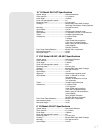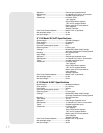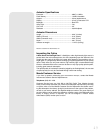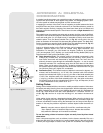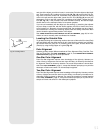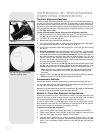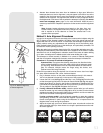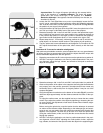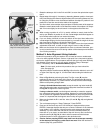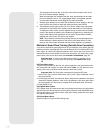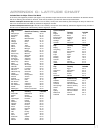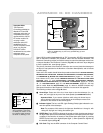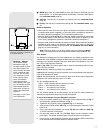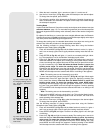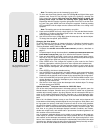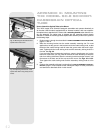
55
7.
Rotate the telescope 180° in the R.A. axis ONLY, to return the optical tube to posi-
tion A.
8.
Repeat steps 5 through 8, if necessary, alternating between position A and posi-
tion B, and bringing the reference object halfway of the remaining distance to cen-
ter. Stop the procedure once the distance between the object in position A and
position B is less than one third the width of the eyepiece.
9. As a final check, select another object and place it into the center of the eyepiece.
Rotate the mount about the R.A.
axis.Watch the motion of that object. It is accept-
able if it moves slightly, but should remain in the eyepiece the entire time.
Tips
a When mo
ving to position A or B, it is usually sufficient to merely level the Dec.
axis by eye. Whether in position A or B, the counterweight shaft should appear to
be horizontal when looked at from several feet away.
a If you are finding it difficult to lower the altitude of the tripod head without the
counterweight banging into the forward tripod leg, increase the length of the two
rear tripod legs to introduce a tilt into the whole mount.
a Before starting the alignment procedure, it is helpful to have the tripod azimuth
adjustment knobs even, to allow an equal range of travel in either direction.
a Make sure the focuser lock is tightened once focus is achieved. Otherwise, grav-
ity may cause the focuser to move during rotation of the telescope and introduce
error into the procedure.
Method 3: Axis Alignment Using Autostar
Perform this procedure during the daytime. You will need to have an unobstructed
view of an easily sighted landmark, such as a light post. Use a low-power eyepiece,
such as the supplied 26mm. This procedure assumes that you have some familiarity
with Autostar's menu structure (you will need to locate the "Setup: Telescope"
menu). If necessary, refer to
AUTOSTAR'S MENUS, page 25.
Note: For best result, perform this procedure after you have trained the
drive. See page 20.
1. Adjust the latitude T-handle screws (26, Fig. 1d) so that the latitude is set to 45°
or higher. See Step #6, page 12, for information about setting the latitude con-
trols.
2. Refer to
Fig. 48 while performing this step. The Dec. motor (B) must be
positioned so that it is at the back of the mount. The optical tube (A) must be
approximately horizontal (
i.e., parallel with the horizon) and the counterweight
shaft must be pointing straight down.
If using a Schmidt-Newtonian model, loosen the cradle ring locks knobs (C)
and move the optical tube until the eyepiece (
D) points downward as shown in
the Fig. 48. Re-tighten the cradle ring locks.
If using a refractor model, use the diagonal assembly to rotate the eyepiece
to a convenient viewing angle during testing. However, be careful that the diag-
onal is placed flush against the focuser and tightened in place using the thumb-
scre
ws
.
It is impor
tant that the diagonal does not slip dur
ing the procedure
.
3.
Mak
e sure that both the R.A.
and Dec.
locks (
17 and 33, Fig.
1d
) are tightened
to a fir
m f
eel.
4. Turn on Autostar and go to "Setup: Telescope." Press ENTER.
5. Press one of the Scroll keys until "LXD 55 Adjust" displays and then press
ENTER.
A message displa
ys that tells y
ou to center a landmar
k.
If the landmar
k
is not visib
le in y
our e
y
epiece
, lift and move the entire telescope and tripod
assembly—try not to move the tube too far from the horizontal position (no
more than 5° up or down), as described in Step #2. You may also use the fine
azimuth controls (
27, Fig. 1d) for side to side movement and the Autostar
Up/Do
wn Arro
ws f
or small adjustments to the declination axis.
6.
Caution:
Before pressing ENTER, step back from the telescope assembly,
as the telescope will begin to rotate about two axes.
When the landmark is
centered (Step #5), press ENTER.
Fig. 48: Method #2 Setup. (A) Optical
Tube; (B) Dec. Motor; (C) Cradle
Ring Lock Knobs; (D) Eyepiece.
Ạ
ạ
Ả
ả
Motor at
back of
mount



